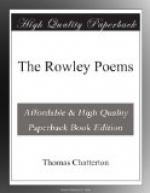The 34 first lines of this poem are extant upon another of the vellum-fragments, given by Chatterton to Mr. Barrett. The remainder is printed from a copy furnished by Mr. Catcott, with some corrections from another copy, made by Mr. Barrett from one in Chatterton’s hand-writing. This poem makes part of a prose-work, attributed to Rowley, giving an account of Painters, Carvellers, Poets, and other eminent natives of Bristol, from the earliest times to his own. The whole will be published by Mr. Barrett, with remarks, and large additions; among which we may expect a complete and authentic history of that distinguished citizen of Bristol, Mr. William Canynge. In the mean time, the Reader may see several particulars relating to him in Cambden’s Britannia, Somerset. Col. 95.—Rymers Foedera, &c. ann. 1449 & 1450.—Tanner’s Not. Monast. Art. BRISTOL and WESTBURY.—Dugdale’s Warwickshire, p. 634.
It may be proper just to remark here, that Mr. Canynge’s brother, mentioned in ver. 129, who was lord mayor of London in 1456, is called Thomas by Stowe in his List of Mayors, &c.
The transaction alluded to in the last Stanza is related at large in some Prose Memoirs of Rowley, of which a very incorrect copy has been printed in the Town and Country Magazine for November 1775. It is there said, that Mr. Canynge went into orders, to avoid a marriage, proposed by King Edward, between him and a lady of the Widdevile family. It is certain, from the Register of the Bishop of Worcester, that Mr. Canynge was ordained Acolythe by Bishop Carpenter on 19 September 1467, and received the higher orders of Sub-deacon, Deacon, and Priest, on the 12th of March, 1467, O.S. the 2d and 16th of April, 1468, respectively.
ON HAPPIENESSE, by WILLIAM CANYNGE. p.
286
ONNE JOHNE A DALBENIE, by the same.
Ibid.
THE GOULER’S REQUIEM, by the same.
287
THE ACCOUNTE OF W. CANYNGE’S FEASTE.
288
Of these four Poems attributed to Mr. Canynge, the three first are printed from Mr. Catcott’s copies. The last is taken from a fragment of vellum, which Chatterton gave to Mr. Barrett as an original. The Editor has doubts about the reading of the second word in ver. 7, but he has printed it keene, as he found it so in other copies. The Reader may judge for himself, by examining the Fac simile in the opposite page.
With respect to the three friends of Mr. Canynge mentioned in the last line, the name of Rowley is sufficiently known from the preceding poems. Iscamm appears as an actor in the tragedy of AElla, p. 66. and in that of Goddwyn, p. 174.; and a poem, ascribed to him, entitled “The merry Tricks of Laymington,” is inserted in the “Discorse of Bristowe”. Sir Theobald Gorges was a knight of an antient family seated at Wraxhall, within a few miles of Bristol [See Rot. Parl.




